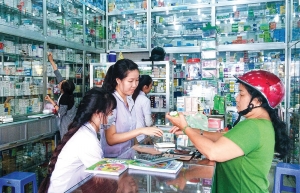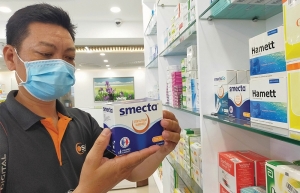New doors will open with pharma legislation changes
 |
| Ngo Thanh Hai, lawyer, LNT & Partners |
These reductions in the deal (EVFTA) create new opportunities for European Union pharma companies, as they can take advantage of lower import tariffs to increase their competitiveness in the Vietnamese market.
With this tariff reduction strategy, Vietnam aims to build a more open and efficient market. However, its commitments to eliminate or reduce tariffs have not yet had a significant impact. Only 71 per cent of pharmaceutical and medicinal materials have had their tariffs eliminated, and the remaining imported products must undergo a lengthy tariff reduction process, while the tariffs before being reduced are already at the low level, with the current standard most favoured nation tariff rate at 5–8 per cent.
Nevertheless, foreign-invested enterprises (FIEs) are encouraged to familiarise themselves with the roadmap and procedures for tariff reduction in order to seize opportunities and enhance the price competitiveness of their products.
The tariff commitments under the EVFTA have had a positive impact on pharmaceutical imports in Vietnam. In December 2024, related import turnover reached $518.17 million, a sharp increase of 68.6 per cent compared to November and 77.3 per cent compared to December 2023. Overall, in 2024, pharma imports totalled nearly $4.4 billion and 27.9 per cent higher from 2023.
The main pharmaceutical exporters to Vietnam are EU countries, highlighting the significant impact of the EVFTA and its tariff reduction provisions in facilitating such imports from the EU into the Vietnamese market.
As the European Union is the largest source of pharmaceuticals and medicinal materials for Vietnam, the agreement has introduced various commitments that are expected to shape the future of the industry. This also poses a challenge for Vietnamese law in terms of implementing changes and amending legal documents to meet these international commitments.
Regarding business rights, the EVFTA facilitates greater foreign investment in Vietnam’s pharmaceutical market. The agreement specifically addresses the rights of FIEs to import pharma products into Vietnam. While this aligns with Vietnam’s commitments under the World Trade Organization, the deal clarifies and resolves ambiguities in previous interpretations of those commitments.
However, this commitment does not introduce any significant differences compared to Vietnam’s commitments and still contains restrictions on business rights by limiting the FIEs’ distribution rights.
The 2024 amendment to Vietnam’s pharmaceutical law provides clear provisions allowing FIEs to engage in activities such as contract manufacturing, technology transfer, and transportation of products to wholesalers’ warehouses. These activities are no longer considered part of the distribution process, improving clarity and making it easier for EU companies to participate in the Vietnamese market.
This change helps eliminate previous confusion in the regulations and removes ambiguous provisions. As a result, the amended law strengthens the position of EU pharma firms in Vietnam, encouraging more investment in the country.
However, after five years of implementation, the business rights of FIEs’ remain significantly restricted, particularly due to limitations on their commercial activities and the lack of a clear and specific legal framework for the distribution and logistics of pharmaceutical products and materials.
Currently, if FIEs that outsource drug manufacturing can only sell contract-manufactured products to other wholesalers, it is considered to make no difference from those directly imported by them. As a result, this rights expansion does not provide substantial value and fails to encourage FIEs, especially multinational corporations, to bring innovative drugs and original brand-name pharmaceuticals to Vietnam for local manufacturing or contract manufacturing with technology transfer.
The EVFTA also includes important provisions related to intellectual property, which are particularly significant for pharmaceutical products. Under the agreement, Vietnam has committed to extending data exclusivity protections for products originating from the EU. This means that companies will have exclusive rights to their product data, preventing competitors from using the same data to gain market approval for similar products during a set period.
In cases where there are delays in the issuance of pharmaceutical licences, the EVFTA ensures that the period of patent protection may be extended, providing additional time for patent holders to maintain their exclusive rights. The 2022 amendment to Vietnam’s Intellectual Property Law introduced compensation measures for patent owners in cases where the competent authority delays the issuance of licences.
Although this law provides monetary compensation, the EVFTA also guarantees patent term restoration based on time delays, a measure that Vietnam may need to further incorporate into its intellectual property regulations for full compliance with the agreement. Noticeably, Article 42 of Decree No.65/2023/ND-CP gives specific guidelines, indicating that if the product is under more than one trademark patent, the total fee applied will be removed if there is any delay in the given process.
With many amendments to the Law on Pharmacy going to take effect, showing Vietnam’s efforts to meet align the local rules with international standards and to improve the business climate, new fresh opportunities will come. However, to enable the country to obtain its ambition of a high-value pharma manufacturing hub in the region by 2030, additional enhancements are in need to be done in the upcoming time.
 | Pharma law upgrades will improve effectiveness The ratification of the law amending and supplementing several articles of the Law on Pharmacy 2016 at the end of November is significant and positive news for the healthcare sector. It is expected to address key shortcomings of the current law while incorporating best practices successfully implemented in other countries. |
 | Turning point created for pharma firms in law changes Amendments to the Law on Pharmacy are receiving strong support from the business community, expecting to create a more powerful legal system for the local market. |
 | Domestic firms under duress with new rules While the amended Law on Pharmacy 2024 is expected to facilitate future performance of foreign-invested enterprises, it might increase pressure on local businesses, urging them to make quick changes to adapt. |
What the stars mean:
★ Poor ★ ★ Promising ★★★ Good ★★★★ Very good ★★★★★ Exceptional
Related Contents
Latest News
More News
- A golden time to shine within ASEAN (February 19, 2026 | 20:22)
- Vietnam’s pivotal year for advancing sustainability (February 19, 2026 | 08:44)
- Strengthening the core role of industry and trade (February 19, 2026 | 08:35)
- Future orientations for healthcare improvements (February 19, 2026 | 08:29)
- Infrastructure orientations suitable for a new chapter (February 19, 2026 | 08:15)
- Innovation breakthroughs that can elevate the nation (February 19, 2026 | 08:08)
- ABB Robotics hosts SOMA Value Provider Conference in Vietnam (February 19, 2026 | 08:00)
- Entire financial sector steps firmly into a new spring (February 17, 2026 | 13:40)
- Digital security fundamental for better and faster decision-making (February 13, 2026 | 10:50)
- Aircraft makers urge out-the-box thinking (February 13, 2026 | 10:39)

 Tag:
Tag:

















 Mobile Version
Mobile Version